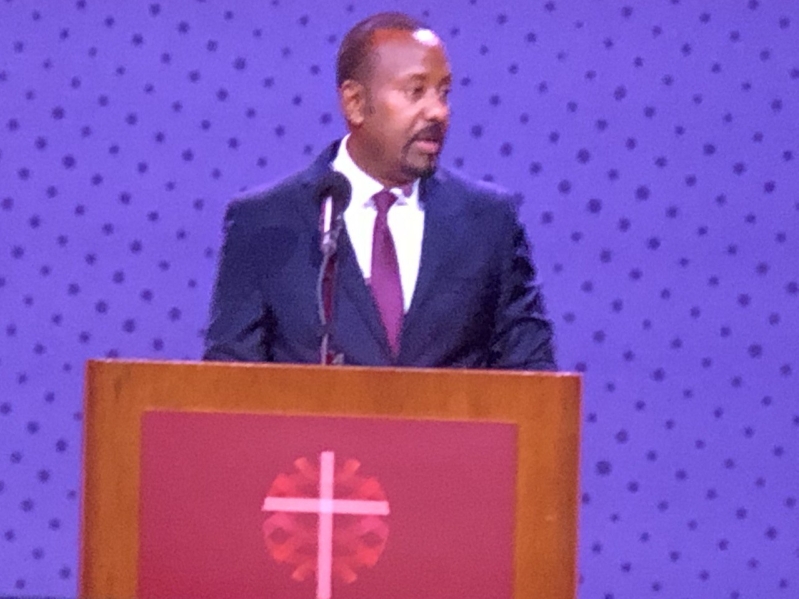
The Prime Minister of Ethiopia Dr. Aby Ahmed issued a powerful call for a renewed global mission, urging the Church to assert its vital relevance in a deeply divided world. Addressing a gathering of evangelicals from across Europe and beyond at the 2025 European Congress on Evangelism in Berlin, Dr. Ahmed asserted that the “Gospel is more than personal, it reshapes society.”
He laid out several proposals for restoring the mission anchored on the need for a deep spiritual renewal, a return to the foundational values of faith and recognizing that “lasting change begins within.” Prime Minister Ahmed emphasized the necessity of embracing a love that honors the dignity of every person, a “love that transcends race or creed and reaches across divisions to foster compassion and redemption.”
This kind of love, he argued, is central to the evangelical movement's vital role in championing a force that breaks barriers and opens pathways for cultures and nations to pursue peace and mutual understanding.
“As followers of Christ, we are called to be the salt of the earth, demonstrating love through actions and deeds,” said Dr. Ahmed. “The evangelical movement must be known not only for what it believes but also for how it loves, how it serves and how it builds.”
Dr. Ahmed also called for reimagining the Church as a truly global community, advocating that missions should move beyond being perceived as “one-directional.” Instead, he proposed that the movement must give way to partnerships and mutual support among churches around the world.
Additionally, he stated that the Church must continue to assert its relevance in a deeply divided world. The gospel, he reminded attendees, speaks not only to eternal hope but also to the needs of life “here and now.”
Drawing on the example of Jesus' ministry, and citing John 8:12, “I am the light of the world,” Dr. Ahmed highlighted its holistic nature: Jesus helped the sick, fed the hungry, and showed compassion not only in moments like Calvary but in every village and town he visited. As followers of Christ, he asserted, believers are called to be the salt of the earth, demonstrating love through actions and deeds.
Dr. Ahmed's call for renewed mission and relevance was set against a backdrop of historical reflection presented throughout the opening session. The host of the congress, Franklin Graham delivered the keynote address, titled "The Command of God to Preach the Gospel," further emphasizing the central theme of evangelism. Speakers recalled the early followers of Jesus, who, after the empty grave, boldly spoke words of hope to every corner of the world, across generations and languages.
The gospel spread northward and westward towards Europe, overcoming challenges like death awaiting them at mountains and the peril of seas. Despite the rise of the Roman Empire, the "gospel of life was consumed" by "fire," leading many to burn with a passion to hear more. Disciples made disciples, and persecution only made proclaimers louder.
The evangelical movement as a force of transformation
The Prime Minister himself paid tribute to those who spread the gospel across the globe and honoured the memory of Dr. Bill Graham “whose love for Ethiopia continues through his family.” He further detailed the historical impact of the evangelical movement, rooting it in the Protestant Reformation, later revived by figures like George Whitefield and John Wesley.
Dr. Ahmed highlighted how the evangelical movement became a global force for change, rooted in Martin Luther's "priesthood of all believers," which saw all aspects of life as divine service. This belief profoundly shaped Europe's work ethic and spurred the rise of modern education, governance, and justice systems.
He cited leaders like William Wilberforce, whose faith led to slavery's abolition, and missionaries such as William Carey and David Livingstone, who spread the gospel globally. These missionaries brought not just salvation but “also practical aid through schools, hospitals, and community development.” Dr. Ahmed affirmed that the movement addressed both spiritual and material needs, fostering leadership and saving lives, and building lasting respect between Africa and Europe.
However, Dr. Ahmed candidly addressed a challenging reality - the momentum of missions from the West began to decline in the latter half of the 20th century. This decline, he stressed, demands deep reflection and appropriate action. He referenced the prophet Jeremiah, suggesting there is value in returning to the "time-tested ways that have led people to what is good, just and lifegiving".
Despite this assessment, Dr. Ahmed conveyed a strong message of hope. He noted that the universal Church is growing, particularly in the Global South, where it is vibrant and increasingly missional. This growth, he asserted, offers a significant opportunity for partnerships rooted in humility and a shared global vision. He underscored the desperate need for hope in today's world and framed carrying forward the legacy of past evangelists as a shared responsibility.
“Our world today is in desperate need of hope. Carrying forward the legacy of those before us is a shared responsibility. We are invited to share the gospel’s message of peace and transformation with a generation longing for change,” asserted Dr. Ahmed.
He concluded his address with a stirring call for individuals to step forward with courage and conviction, likening them to figures like Nehemiah, Zerubbabel, and Paul, to help renew the global impact of the gospel.
Acknowledging that the "harvest is plentiful but the workers are few," he stated that the work ahead is great but expressed confidence that those gathered were among those willing to step forward with humility and resolve.





